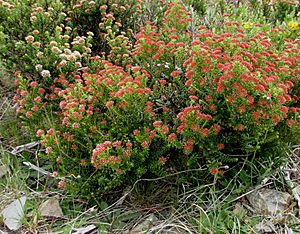Alpine everlasting facts for kids
Quick facts for kids Alpine everlasting |
|
|---|---|
 |
|
| Ozothamnus alpinus Mount Hotham, Victoria |
|
| Scientific classification | |
| Kingdom: | |
| (unranked): | |
| (unranked): | |
| (unranked): | |
| Order: | |
| Family: | |
| Tribe: |
Gnaphalieae
|
| Genus: |
Ozothamnus
|
| Species: |
O. alpinus
|
| Binomial name | |
| Ozothamnus alpinus (N.A.Wakef.) Anderb.
|
|
| Synonyms | |
|
Helichrysum alpinum N.A.Wakef. |
|
Ozothamnus alpinus, also known as the alpine everlasting, is a type of shrub that belongs to the Asteraceae family. This plant is special because it only grows in the high, cold mountain areas of New South Wales and Victoria in Australia.
Discovering the Alpine Everlasting
This unique plant is often found in places that are very high up, like mountains. It loves cool, wet areas such as wet alpine heathlands or bogs. You can find it in the Mount Kosciuszko area and further south.
What Does the Alpine Everlasting Look Like?
The alpine everlasting usually grows to be about 0.75 to 1 metre tall, which is roughly the height of a young person. Its leaves are shaped like oblongs, measuring about 4 to 10 millimetres long and 2 to 3 millimetres wide. The top side of the leaves is a shiny green, while the underside is yellowish and covered with soft hairs.
The plant's white flowers appear in small, tight groups. They bloom from December to March, which is summer in Australia. Before the flowers fully open, you can see pretty pink or red outer parts called bracts. These stand out nicely against the white flowers.
How Was This Plant Named?
The alpine everlasting was first officially described in 1951 by a scientist named Norman Wakefield. He studied a plant sample that Carl Walter had collected way back in 1888 from Mount Hotham. Norman Wakefield first gave the plant the name Helichrysum alpinum. Later, in 1991, scientists decided to move the species to a different group, so its name was changed to Ozothamnus alpinus.

